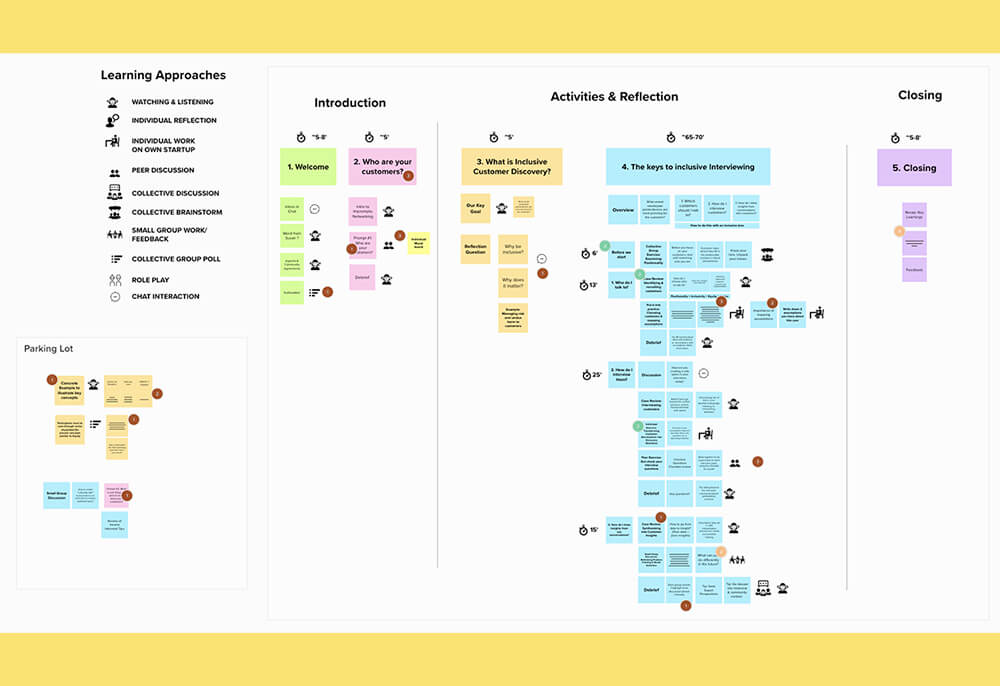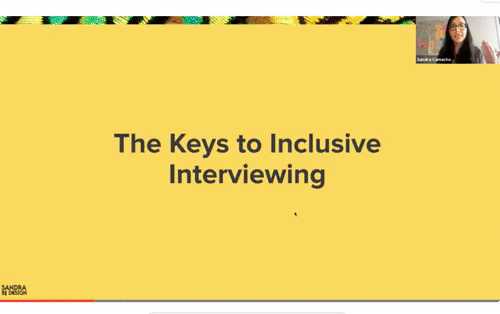Summary
Challenge: Train underrepresented founders on how to conduct customer discovery using inclusive approaches
Outcomes: High degrees of participant engagement and satisfaction relative to inclusivity and practical application of workshop experience
“Collaborating with Sandra exceeded my expectations! I greatly valued Sandra's organization and structured approach to co-creating a new workshop specific to the needs of the Startups for All curriculum. Feedback from the founders was overwhelmingly positive – the learnings gave them invaluable insight and practical tips to take action on. I hope to offer this workshop again soon!”
- Susan Liao, Founder
The Client and Business Challenge
Startups for All is a US-based purpose-driven online incubator for self-funded founders from underrepresented populations established by Susan Liao in 2021. The Startups for All mission is to build a world with full representation of womxn, women of color, and queer/trans BIPOC as startup CEOs, going from less than 1% today to 51% by 2026.
I was enlisted by Susan, the founder of the incubator, to help the self-funded founders in the first ever cohort of the incubator become more inclusive in customer discovery.
I kicked off with discovery sessions with Susan and a review of survey data on the March 2021 Founder Cohort to identify the needs of the audience and the end goals for the session.
The audience: Self-funded founders who...
- hail from a wide variety of cultural backgrounds and disciplines
- have disparate levels of tech savviness and familiarity with design-driven practices
- have an MVP under development or launched
- work either part-time or full-time on their venture
- derive value from peer-to-peer discussions and feedback
Success means...
- Equipping founders with a bank of questions to broaden the definition of key customer segments, mitigate bias and reduce harm throughout the customer discovery process
- Enabling the immediate application of learnings on the founder own ventures and to get feedback from peers
Building the experience through co-design and iterative prototyping
I closely adhere to the principles of codesign (that is, designing with and not just for) and iterative prototyping (that is, creating rough versions and evolving them rapidly based on feedback) when it comes to creating learning experiences.
For this project, I worked hand-in-hand with Susan, the founder of the incubator, to define expected learning outcomes, identify constraints and iteratively scope the content and map the experience.
Defining learning objectives and scoping content
We started with a central question: “What unmet needs, pain points, and/or desires are most pressing for my key customer segments?”
After multiple iterations of learning outcomes, we landed on:
- Formulate inclusive questions in user interviews and research surveys in order to mitigate bias
- Transform research data into customer insights
Through virtual whiteboarding in Mural, I led Susan through a freeform brainstorm and priority exercise to scope content. I then mapped out multiple iterations of the session (thanks to several feedback exchanges) as a rough content map and landed on a personalized learning flow cutting across a bank of questions:
- Who are my customers?
- What is inclusive customer discovery?
- Who do I interview (and who may I be overlooking)?
- How do I interview my customers?
- How do I transform data collected into customer insights?

With close adherence to a prototype-driven approach, the initial content map evolved into a rough storyboard/wireframe and then eventually to higher-fidelity slides and Mural templates and a polished session outline.
“Keep it Simple” Design Approach
Because we only had a 90 minute runtime and many edge cases to account for in terms of participant knowledge, I adopted a “Keep it Simple” approach for the design and facilitation of the experience.

The session was light on content – a few short case studies and short explanations with limited jargon and concrete examples across the following key topics:
- Diversifying the types of customers researched
- Adopting ethical practices on participant compensation, consent and data collection
- Formulating inclusive questions and reworking them to reduce bias
- Framing problems in light of sociocultural context and structural inequities
It favored real-life practical application on an individual Mural board by each founder on their own customers alongside with ample opportunities for peer feedback and discussion.
The creation of individual boards for each participant with detailed instructions and an inspirational example, as well as a Loom recording proposed by Susan, made it so that others could participate asynchronously.
Building Trust and Inclusivity in the Group
I worked closely with Susan to build upon the community agreements for her incubator and to create the conditions for a judgment-free, safe space for participants. This would provide trust and comfort in exploring their own identities relative to those of their customers, to identify oversights in how they’re defining customers today and to confront and unpack their biases.
Outcomes
- Satisfaction: Overall, the workshop was well received by the 7 participants who attended live, receiving an average overall rating of 8.5 out of 10 from 6 survey respondents
- Engagement: All participants stated that they felt the session was extremely engaging, that they felt safe to participate, and that they had an equitable opportunity to participate
- Practical Application: The majority of participants said that they could integrate the session concepts into their own work very well or extremely well
As the workshop was a pilot, the goal is to embark on continuous improvement to make the concepts more accessible, to mitigate technical issues, and to address potential contradictions between diversifying customer segmentation versus addressing a specific target market.
Participant Feedback
“It was very participatory and engaging. Gave me structure to think about important questions I needed to ask”
- Anonymous Participant
"I really liked the speaker and the example case study. I am a big fan of real-life case studies too that teach me lessons and I can look back on to understand over and over what works and doesn't!
- Anonymous Participant
“I liked asking myself to be mindful as to how I may be creating harm through bias"
- Anonymous Participant
“It was uncomfortable, but that’s when I know that I’m growing the most.”
- Anonymous Participant










